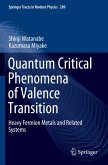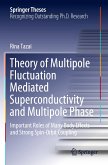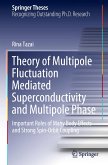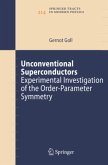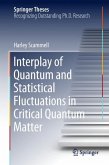This book comprehensively presents an unconventional quantum criticality caused by valence fluctuations, which offers theoretical understanding of unconventional Fermi-liquid properties in cerium- and ytterbium-based heavy fermion metals including CeCu2(Si,Ge)2 and CeRhIn5 under pressure, and quasicrystal beta-YbAlB4 and Yb15Al34Au51.
The book begins with an introduction to fundamental concepts for heavy fermion systems, valence fluctuation, and quantum phase transition, including self-consistent renormalization group theory. A subsequent chapter is devoted to a comprehensive description of the theory of the unconventional quantum criticality based on a valence transition, featuring explicit temperature dependence of various physical quantities, which allows for comparisons to relevant experiments. Lastly, it discusses how ubiquitous the valence fluctuation is, presenting candidate materials not only in heavy fermions, but also in strongly correlated electrons represented by high-Tc superconductor cuprates.
Introductory chapters provide useful materials for learning fundamentals of heavy fermion systems and their theory. Further, experimental topics relevant to valence fluctuations are valuable resources for those who are new to the field to easily catch up with experimental background and facts.
The book begins with an introduction to fundamental concepts for heavy fermion systems, valence fluctuation, and quantum phase transition, including self-consistent renormalization group theory. A subsequent chapter is devoted to a comprehensive description of the theory of the unconventional quantum criticality based on a valence transition, featuring explicit temperature dependence of various physical quantities, which allows for comparisons to relevant experiments. Lastly, it discusses how ubiquitous the valence fluctuation is, presenting candidate materials not only in heavy fermions, but also in strongly correlated electrons represented by high-Tc superconductor cuprates.
Introductory chapters provide useful materials for learning fundamentals of heavy fermion systems and their theory. Further, experimental topics relevant to valence fluctuations are valuable resources for those who are new to the field to easily catch up with experimental background and facts.


